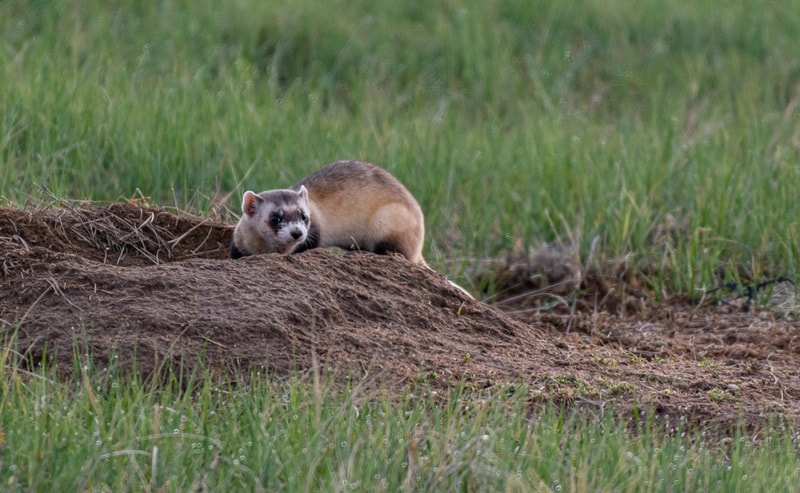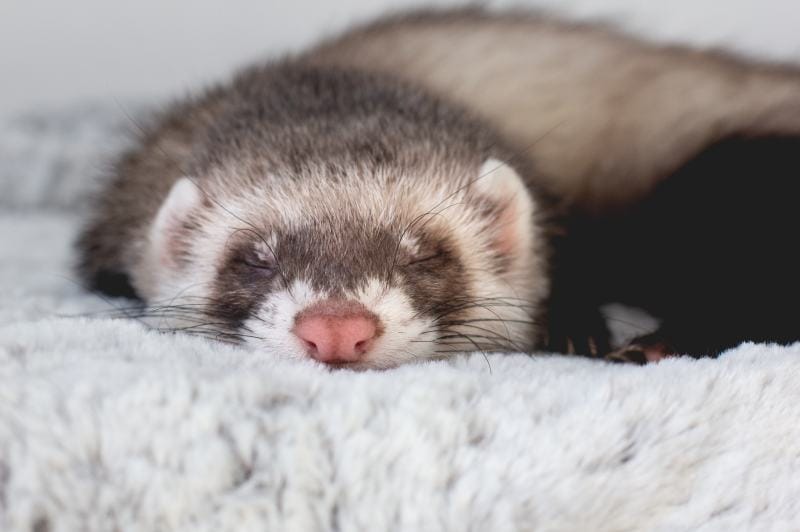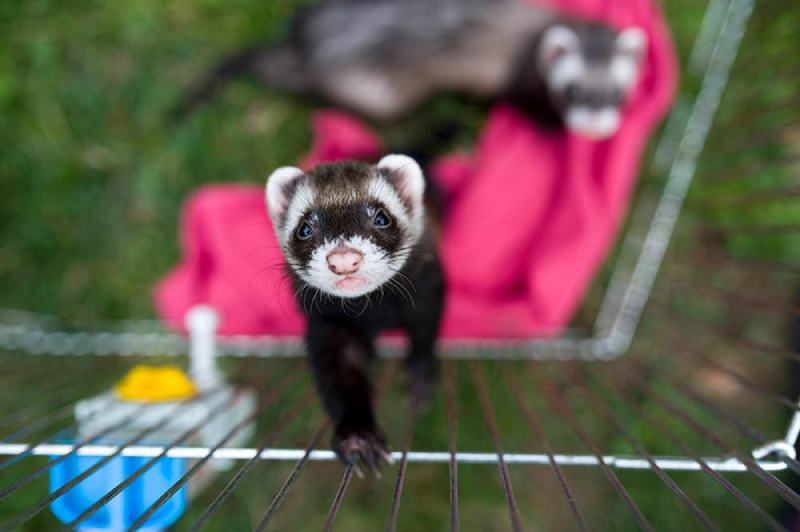Can Ferrets Eat Apples? Vet Approved Risks & Safety Tips
By Kit Copson
Updated on

Click to Skip Ahead
The humble apple is a common treat for a number of small, furry animals, but this doesn’t include ferrets. They are carnivores, and ferrets shouldn’t be allowed to eat apples and other types of fruit because their digestive systems aren’t built to handle this kind of food.
In this post, we’ll explain exactly why it’s unwise to feed fruits to ferrets and explore their dietary needs in more depth.
Why Can’t Ferrets Eat Apples?
If you hand your ferret a piece of apple, they might nibble away contentedly, but that doesn’t mean it’s healthy for them. Apples and other fruits contain complex carbohydrates. Ferrets require a diet that doesn’t contain any complex carbohydrates because their digestive systems can’t process them due to the fact that ferrets lack a cecum.
The cecum is a pouch in the large intestine that helps animals digest plant matter by producing bacteria. Herbivores have a very large cecum, while an omnivore’s is much smaller. You will know the human cecum by another name: the appendix. Like humans, dogs and cats have a small, rudimentary cecum, but ferrets have none at all. In fact, their small intestine merges with the large intestine with very little change in external anatomy, and their digestive tract is quite short and simple when compared to that of some other carnivores.
For this reason, feeding foods containing complex carbohydrates (including fruit) to a ferret could cause a variety of problems, including diarrhea, intestinal problems, and blood sugar swings.
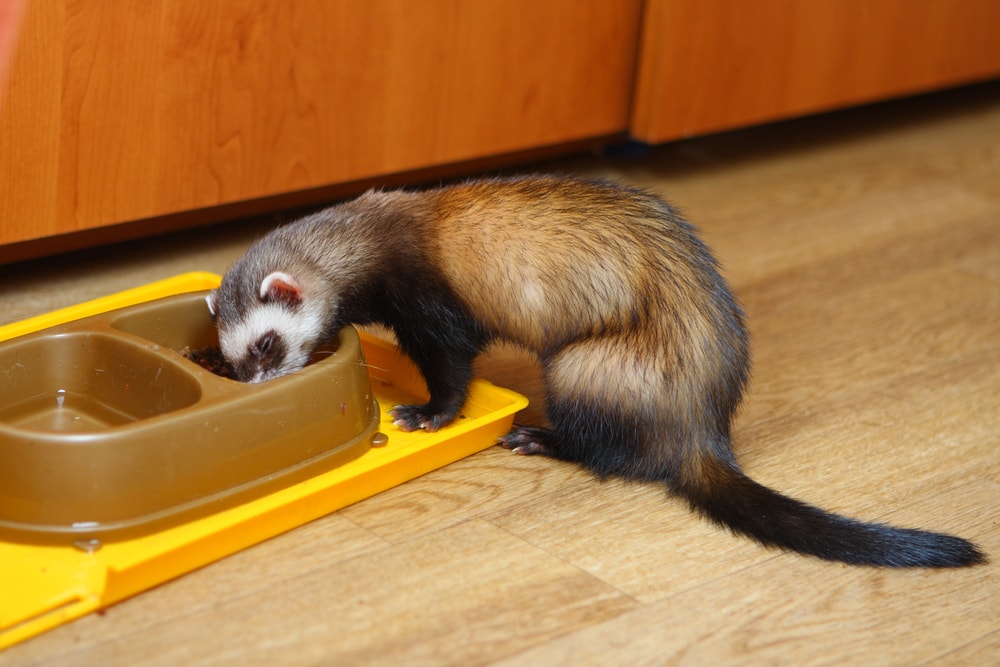
Can Ferrets Have Apples as Treats?
This is not recommended. While a small amount of apple eaten by mistake may not be harmful, your ferret may end up with an upset stomach. Suitable occasional treats for ferrets include pieces of cooked or raw meat, cat treats, and eggs (one per week is okay: avoid feeding eggs regularly, though). Even if your ferret seems to enjoy a bit of fruit, we shouldn’t allow them to eat it.
What’s a Suitable Diet for a Ferret?
Ferrets are obligate carnivores, which means they survive on protein and fat from meat sources. A ferret’s ideal diet contains 32–40% protein, 10–15% fat, and no more than 4% fiber.
If you’re thinking about offering dry food, there are commercially-crafted dry formulas available for ferrets, though some people choose to feed kitten food as an alternative, as this is high in protein. It’s best to go with a formula from a high-quality, reputable brand for the best nutritional value.
The American Ferret Association advises that a ferret’s dry food should contain a minimum of 36% protein and around 20% fats. The carb level should be low. Dry food should be left out for your ferret at all times because they have a high metabolism and need to eat frequently.
Raw Diets
Another option is to feed your ferret a raw diet, which is made up of fresh meat (chicken, lamb, beef, etc.), bones (good for ferrets’ teeth, but should only be offered raw), and organs. Alternatively, a whole prey diet, which consists of frozen meat like chicks and mice, is a raw option for the non-squeamish. These types of foods don’t need to be made permanently available like dry food, but should be offered at regular intervals.
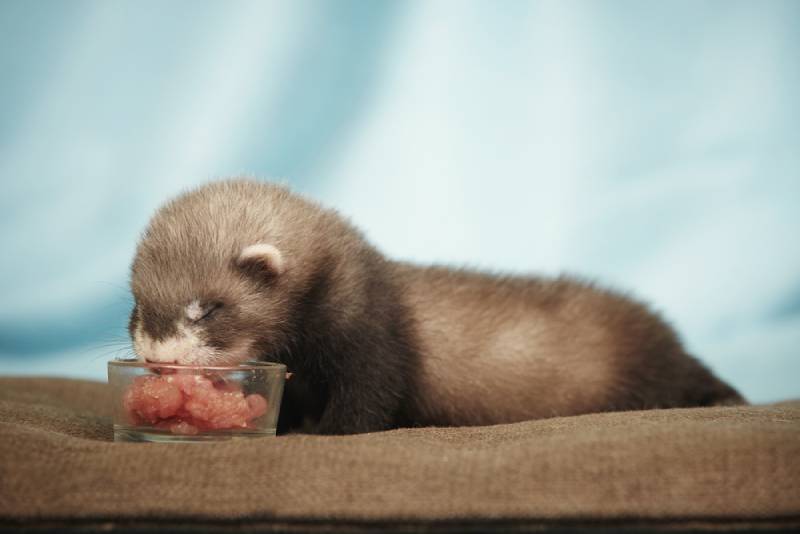
Convalescent Ferret
If your ferret is unwell and not eating, your vet may recommend offering what’s commonly known as “duck soup” (a mixture of water with dry food or other ingredients to create a sort of soup) temporarily. It’s wise to introduce this to your ferret as a treat when they’re well so they’ll get used to it. Finally, don’t forget to make sure your ferret has permanent access to water.
Safe Foods Checklist
- Chicken (and organs and stripped carcasses)
- Lamb (and organs)
- Beef (and organs)
- High-quality ferret or kitten kibble
- High-quality meat products
- Water
Raw bones are also fine for ferrets as long as they’re big enough to not be swallowed whole. It’s wise to check with your vet first, though, because some health conditions may make raw bones an unsuitable choice (dental issues, for example).
Beware: Ferrets are curious animals, and many won’t hesitate to chew on something new and interesting they find dropped on the floor or left out around your home. Check for small items they could potentially swallow and keep them out of your ferret’s reach.
Final Thoughts
Having a good understanding of your ferret’s dietary needs is crucial for making sure they stay healthy. There are so many foods out there that can make ferrets seriously unwell, including fruits. As carnivores, they have nothing to gain nutritionally from fruit, so don’t worry about them missing out.
If you have questions about your ferret’s diet or aren’t completely sure about a certain food item, please seek advice from a veterinarian with ferret experience.
Featured Image Credit: pasja1000, Pixabay




